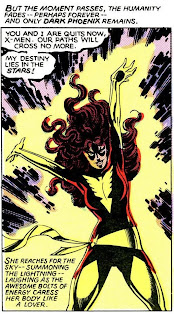It also reminds me of some more modern exemplars of the genre, which is a theme I believe I’ve delved into before: the odd sensation of being relatively young compared to the historical sweep and scope of an entire pop-subculture, and thus experiencing things backwards, discovering the newest iterations and then eventually getting around to backtracking through the influences. Semi-disorienting, but fun.
So, thuddingly obviously, Star Wars. The space opera of John Carter of Mars is obviously an antecedent of Lucas’s film saga, something which was fairly obvious simply based on the vague mental picture of John Carter I had osmotically formed before reading it first-hand. You might argue that John Carter gets to Star Wars indirectly by way of Flash Gordon, but I was intrigued to find some more direct links as well. Swordplay, for example. The adventures of John Carter boil down to a Virginia military man who finds himself on a strange planet where global civilizations have fallen into decline, but not until after developing handguns that shoot exploding radium bullets and giant flying battleships and various other technological marvels. Yet just about everyone Carter kills (and the body count is impressive) dies on the point of his longsword, and not because he’s the outsider who doesn’t have access to the guns, either. So there’s a quasi-Jedi aesthetic at play there, I think, where the sword comes across as the more elegant weapon compared to the firearm. Lucas may have upgraded the technology from swords to lightsabers and pistols to laser blasters, but the essential split remains.
Obligatory English Major Observation: there’s something death-and-resurrection-like in John Carter’s travels back and forth from Earth to Mars. Everybody look at the character’s initials now. I am sometimes amazed that the hero of Star Wars is not named Juke Crywalker. (Which would have been apt given that one of the fundamental rules of Drinking Star Wars is “every time Luke whines” – hiyo!)
Also, getting back to the point I raised in my discussion of trilogies and series in general, I’m especially glad I had the entire trilogy in one volume and was planning on reading them straight through anyway. Because there’s a certain Empire Strikes Back vibe to the second novel The Gods of Mars, which ends with Carter’s Martian soulmate, the princess Dejah Thoris, trapped beyond Carter’s reach, perhaps permanently unless he can find a way to save her. Again, Lucas may have gender-swapped things when he had Han Solo frozen in carbonite and Princess Leia left to devise his rescue, but the compelling downer ending is indebted nonetheless.
(Note that I am a lifelong Star Wars fan and I will never, ever let that go. Pulling back the curtain on Lucas’s sources does not in any way make me love the original trilogy less. Most of Star Wars is stolen from earlier stories. Most of everything is stolen from something that came before.)
I also spotted another influential connection between Burroughs and one of my beloved childhood entertainments, slightly more obscure than Star Wars. All right, well, given that they have a movie trilogy of their own now, maybe the X-Men aren’t any more obscure than Star Wars, but at the auteur level, everyone knows who George Lucas is, whereas comics are by nature written by a succession of writers and you have to be something of a geek-level fan to be able to spout off the scripting credits for any given title. Fortunately for purposes of this discussion, I am that guy.

One thing which the classic pulps and almost all comic books share in common is their purple prose, which is one of those generalizations which of course varies in applicability from case to case. Chris Claremont, who has written a lot of X-Men comics in his time (including a lot of stone cold classics as well as a lot of the issues I read in my formative, seriously-getting-into-comics years), could be accused of oft dipping his quill into the violet ink, but it might be more accurate to say that he had a lot of signature verbal tics which weren’t necessarily overwrought in and of themselves, but became kind of jokes for how often he would work them into the comics’ narration over and over and over again. (I am far from the first blogger to acknowledge this.) The X-Men under Claremont’s pen are forever throwing themselves into things “body and soul” or utilizing superpowers that represent “the focused totality” of some characteristic. And when the fighting in Claremont’s stories gets really intense, you can bet that you will eventually be informed that “no quarter is asked, and none given.”
Guess who else frequently narrated battle scenes by asserting that quarter was hard to come by on either side, in the exact same verbal formulation? Maybe it’s actually a cliché with a life of its own that goes farther back into the 19th century or earlier, but I would be willing to bet that if you were to ask Chris Claremont if he read Edgar Rice Burroughs as a kid, he’d admit as much. Sadly, Claremont did not incorporate into his own stock verbiage collection the phrase which Burroughs uses even more than “no quarter was asked and none given.” When John Carter isn’t running Martians through with his longsword, he’s socking them in the jaw with his superior Earth muscles powering the punch, and the Martians always drop “like a felled ox.” And that turn of phrase is DELICIOUS. I may just have to start decking stupid people so I can work it into conversation myself.

No comments:
Post a Comment